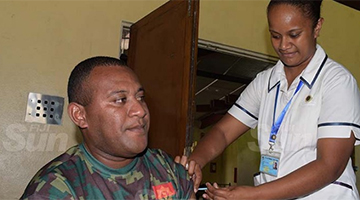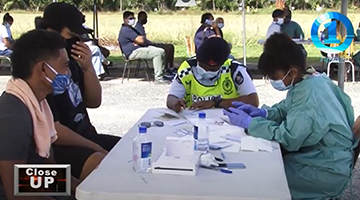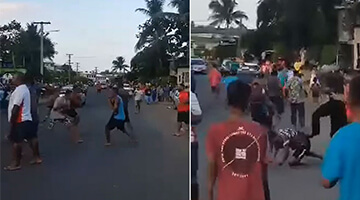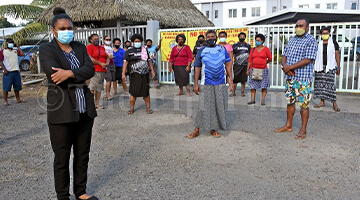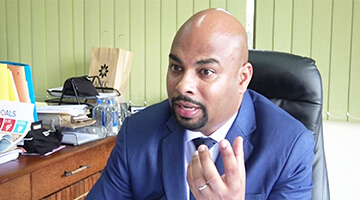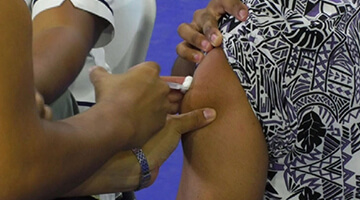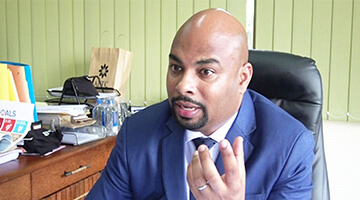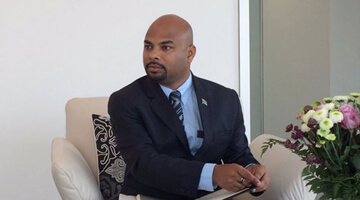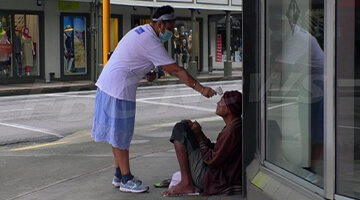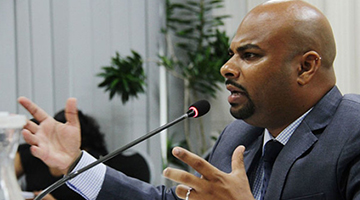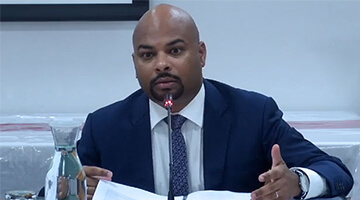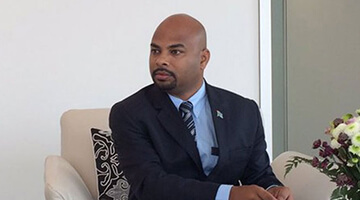- Accessibility:
- Text Size
Covid-19
- Home
- Covid-19
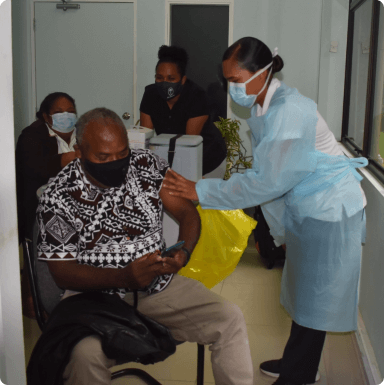
Human Rights in the context of Covid-19
The Human Rights and Anti-Discrimination Commission has the constitutional mandate of developing a culture of human rights in Fiji by promoting the protection, observance and respect for human rights in both public and private institutions. It does so by educating the public about their rights and freedoms, receiving and investigating alleged violations of human rights and taking steps to address these violations including conciliations and making application to court for redress, making recommendations to Government in relation to existing and proposed laws to ensure compliance with human rights standards as well as ensuring compliance by the State in fulfilling its international human rights obligations with respect to international human rights treaties and conventions.
Our COVID-19 Response
The Commission was operational during lockdowns in 2020 and remains operational in the second wave of this pandemic.
In addressing the impact of the COVID-19 pandemic, the Commission continues to receive complaints and advocate through mainstream and digital media platforms on key human rights concerns particularly in relation to accessibility of health and medical services, COVID-19 vaccination including access to critical information pertaining to the vaccine, access to food, cruel and degrading treatment at the hands of law enforcement agencies, right to economic participation, employment relations matters including foreign nationals working in Fiji, right to free speech, fake news, hate speech, limitations to freedom of movement, and how to interpret limitations to rights using international human rights guidelines such as the Siracusa Principles.
In addressing the impact of the COVID-19 pandemic, the Commission continues to receive complaints and advocate through mainstream and digital media platforms on key human rights concerns particularly in relation to accessibility of health and medical services, COVID-19 vaccination including access to critical information pertaining to the vaccine, access to food, cruel and degrading treatment at the hands of law enforcement agencies, right to economic participation, employment relations matters including foreign nationals working in Fiji, right to free speech, fake news, hate speech, limitations to freedom of movement, and how to interpret limitations to rights using international human rights guidelines such as the Siracusa Principles.
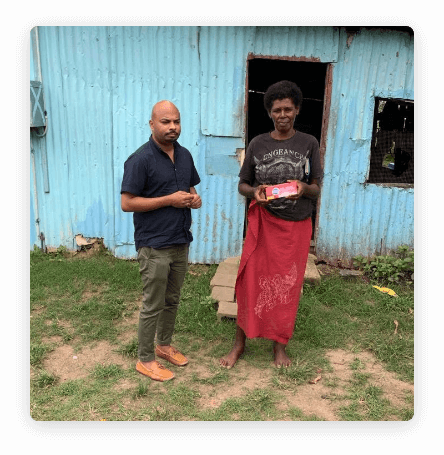
The Commission continues to receive complaints and concerns on intersectional human rights issues in the context of curfews and travel restrictions placed to contain movements outside Viti Levu. Rights of vulnerable groups including women, children, persons with disabilities and the LGBTI in the context of COVID19 remains central to the work of the Commission.
Areas of intervention by the HRADC in the
context of the pandemic include:
- The Commission has assisted families in home isolations, quarantine facilities and containment zones in facilitating the provision of food and other essentials particularly in Lautoka, Sigatoka and in the Lami-Suva-Nausori corridor. The Commission also works closely with the business community and social clubs such as the Rotary Club of Lautoka and the Ministry of Economy in assisting individuals and families in need.
- The Commission continues to work closely with the Ministry of Health and Medical Services by bringing to their attention urgent requests from members of the public who seek medical attention, swabs, ambulance services and information about vaccination.
- The Commission has attended to complaints in relation to mandatory vaccination – ‘no jab, no job’ policy. The Commission also received complaints against anti-vaxxers at workplace.
- The Commission has facilitated discussions with Ministry of Health and Medical Services in relation to members of the public who seek exemption from getting vaccinated based on medical grounds.
- The Commission has investigated complaints of job losses and concerns over the invocation of Force Majeure (“Act of God”) by employers to terminate work contracts or pay cuts
- The Commission has attended to complaints related to non-payment of maternity leave, reduced hours and pay-cuts during the pandemic.
- The Commission has also attended to complaints relating to non-payment of Fiji National Provident Fund (FNPF) contribution by some employers and complaints relating to some employers failing to assist their employees to access FNPF funds during the pandemic.
- The Commission continues to attend to foreign workers in facilitating the provision of food and medication. A recent example is that of 16 COVID positive workers by liaising with their employers. The Commission has also liaised with employers to provide food rations, toiletries and cooking gas to foreign nationals awaiting their repatriation flights.
- The Commission is working closely with the Department of Immigration in facilitating repatriation of foreign nationals employed by local businesses.
- The Commission has issued statements condemning racist and xenophobic stereotyping against certain communities as well as religious vilification targeting certain communities in the context of the pandemic.
- The Commission has attended to complaints regarding quarantine facilities in relation to food and condition of the quarantine facilities in ensuring that it is consistent with human dignity.
- The Commission continues to attend to complaints received from COVID-19 positive patients admitted in hospitals.
- The Commission has facilitated the provision of sign language interpreters on the two national television stations during peak news hour to ensure all Fijians including the deaf community have access to critical and accurate information and related state-initiatives in relation to the pandemic. The Commission wrote to both television stations on the importance of having inclusive news and collaborated with UNDP (Access to Justice Project) for financial support.
- The Commission has ensured that the deaf community have access to a specific contact number they could use to access critical information from Ministry of Health and Medical Services or report matters relating to COVID-19 because they cannot use 158 given their disability.
- The Commission has attended to complaints regarding persons with disabilities not wearing face masks and shoes in public places.
- The Commission continues to attend to complaints of domestic violence and requests for filing of Domestic Violence Restraining orders.
- The Commission assisted has assisted some women and children access food rations, baby clothing and medication.
- The Commission also assisted elderly persons access medical services during the pandemic.
- The Commission has attended to complaints in relation to “no jab, no access” policy implemented by service providers including statutory bodies.
- The Commission has assisted individuals secure pass from Ministry of Health and Medical Services and Fiji Police Force to attend to relatives who were unwell and hospitalised in containment zones.
- The Commission also facilitated a pass for a 3-year-old child who was stuck at his grandfather’s place in Suva and needed to go back to Raki Raki to his mother.
- The Commission has assisted individuals who lost their jobs access social security schemes such the Fiji National Provident Fund.
- The Commission has intervened and assisted a family secure the body of a loved one from a care home for the last rites during the pandemic in accordance with their faith.
- The Commission has also attended to complaints in relation to the alleged mixing of non-covid bodies with covid-positive bodies at the morgue in one of the hospitals.
- The Commission continues to attend to complaints in relation to the violation of rights of arrested detained persons in the context of arrests made for alleged breach of curfew hours and breach of COVID safety protocols such as failing to wear a mask.
- The Commission continues to monitor compliance of police stations and correction facilities with COVID-19 safety protocols.
- The Commission has also conducted snap checks in public spaces including busy shopping centres on the implementation of protective measures such as wearing of masks and practising physical distancing.
- The Commission has received concerns regarding misinformation, hate speech and fake news on social media platforms during the pandemic.
- The Commission held two vaccination drives at its office to facilitate vaccination as well as create awareness and encourage the public to choose to get vaccinated.
- Issued an in-depth analysis from a human rights perspective on vaccination, on balancing rights and restrictions in the context of COVID-19, rights of persons with disabilities, right to housing and sanitation, freedom from arbitrary evictions, accessibility of health services without discrimination particularly for those with no access to social mobility, issues of human dignity such as the circulation of disparaging videos on social media that mock sign language interpreters.
